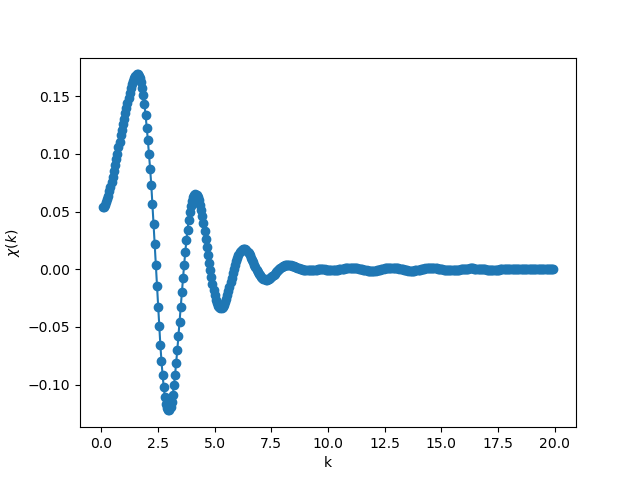XAFS Solver¶
In this section, we will explain how to install and test FEFF.
Download and Install¶
First, you need to obtain the source package of odatse-XAFS from the repository.
$ git clone https://github.com/2DMAT/odatse-XAFS.git
$ cd odatse-XAFS
Next, you need to download the source files of FEFF from the repository, and build it. A setup script is provided for this proocess.
$ cd sample/feff
$ sh ./setup.sh
When it is successful, feff85L will be created in the current directory.
Note
If you use intel Fortran compiler, you need to edit setup.sh before running the script.
Note
In the abve setup script, a patch to FEFF is applied that suppresses output of several unused files to reduce the amount of temporal files.
Calculation execution¶
In this tutorial, we will actually do the calculation using FEFF.
The sample input files are located in sample/solver of odatse-XAFS.
$ cd sample/solver
Next, copy feff85L to the current directory.
$ cp ../feff/feff85L .
Execute feff85L. The input file is feff.inp. (The name of the input file is fixed.)
$ ./feff85L
Then, the following log messages will be displayed, and a number of output files are generated.
Feff 8.50L
Sample_data
Calculating potentials ...
free atom potential and density for atom type 0
free atom potential and density for atom type 1
free atom potential and density for atom type 2
initial state energy
overlapped potential and density for unique potential 0
overlapped potential and density for unique potential 1
overlapped potential and density for unique potential 2
muffin tin radii and interstitial parameters
iph, rnrm(iph)*bohr, rmt(iph)*bohr, folp(iph)
0 1.52927E+00 1.20700E+00 1.15000E+00
1 1.64543E+00 1.30998E+00 1.15000E+00
2 1.24843E+00 9.73397E-01 1.15000E+00
mu_old= -0.301
Done with module 1: potentials.
Calculating cross-section and phases...
0.579139710436025 4.256845921991644E-004 2.895698552180123E-002
10
absorption cross section
dx= 5.000000000000000E-002
phase shifts for unique potential 0
phase shifts for unique potential 1
phase shifts for unique potential 2
Done with module 2: cross-section and phases...
Preparing plane wave scattering amplitudes...
Searching for paths...
WARNING: rmax > distance to most distant atom.
Some paths may be missing.
rmax, ratx 6.00000E+00 0.00000E+00
Rmax 6.0000 keep and heap limits 0.0000000 0.0000000
Preparing neighbor table
Paths found 2 (maxheap, maxscatt 1 1)
Eliminating path degeneracies...
Plane wave chi amplitude filter 2.50%
Unique paths 2, total paths 2
Done with module 4: pathfinder.
Calculating EXAFS parameters...
doing ip = 1
Curved wave chi amplitude ratio 4.00%
Discard feff.dat for paths with cw ratio < 2.67%
path cw ratio deg nleg reff
1 0.1000E+03 1.000 2 1.8833
2 0.3835E+02 1.000 2 2.1978
2 paths kept, 2 examined.
Done with module 5: F_eff.
Calculating chi...
feffdt, feff.bin to feff.dat conversion Feff 8.50L
Sample_data Feff 8.50L
POT Non-SCF, core-hole, AFOLP (folp(0)= 1.150)
Abs Z=28 Rmt= 1.207 Rnm= 1.529 K shell
Pot 1 Z=16 Rmt= 1.310 Rnm= 1.645
Pot 2 Z= 8 Rmt= 0.973 Rnm= 1.248
Gam_ch=1.576E+00 H-L exch Vi= 0.000E+00 Vr=-5.000E+00
Mu=-3.013E-01 kf=1.695E+00 Vint=-1.125E+01 Rs_int= 2.140
PATH Rmax= 6.000, Keep_limit= 0.00, Heap_limit 0.00 Pwcrit= 2.50%
2 paths to process
path filename
1 feff0001.dat
2 feff0002.dat
Use all paths with cw amplitude ratio 4.00%
S02 1.000 Global sig2 0.00160
Done with module 6: DW + final sum over paths.
$ ls
atoms.dat feff0002.dat fpf0.dat log1.dat misc.dat mod5.inp pot.bin
chi.dat feff85L geom.dat log2.dat mod1.inp mod6.inp run.log
feff.bin files.dat global.dat log4.dat mod2.inp mpse.dat s02.inp
feff.inp fort.38 list.dat log5.dat mod3.inp paths.dat xmu.dat
feff0001.dat fort.39 log.dat log6.dat mod4.inp phase.bin xsect.bin
Visualization of calculation result¶
Among the output files, we will refer chi.dat for the spectrum data, whose contents are as follows:
# Sample_data Feff 8.50L
# POT Non-SCF, core-hole, AFOLP (folp(0)= 1.150)
# Abs Z=28 Rmt= 1.207 Rnm= 1.529 K shell
# Pot 1 Z=16 Rmt= 1.310 Rnm= 1.645
# Pot 2 Z= 8 Rmt= 0.973 Rnm= 1.248
# Gam_ch=1.576E+00 H-L exch Vi= 0.000E+00 Vr=-5.000E+00
# Mu=-3.013E-01 kf=1.695E+00 Vint=-1.125E+01 Rs_int= 2.140
# PATH Rmax= 6.000, Keep_limit= 0.00, Heap_limit 0.00 Pwcrit= 2.50%
# S02=1.000 Global_sig2= 0.00160
# Curved wave amplitude ratio filter 4.000%
# file sig2 tot cw amp ratio deg nlegs reff inp sig2
# 1 0.00160 100.00 1.00 2 1.8833
# 2 0.00160 38.35 1.00 2 2.1978
# 2/ 2 paths used
# -----------------------------------------------------------------------
# k chi mag phase @#
0.0500 5.362812E-02 2.330458E-01 2.321993E-01
0.1000 5.425108E-02 2.327328E-01 2.352690E-01
0.1500 5.608660E-02 2.318076E-01 2.443784E-01
0.2000 5.790322E-02 2.308804E-01 2.534995E-01
0.2500 6.083927E-02 2.293763E-01 2.684505E-01
0.3000 6.372689E-02 2.278648E-01 2.834501E-01
0.3500 6.758157E-02 2.258418E-01 3.038991E-01
0.4000 7.135477E-02 2.237971E-01 3.245020E-01
0.4500 7.589064E-02 2.213458E-01 3.499599E-01
0.5000 8.032632E-02 2.188382E-01 3.758443E-01
0.5500 8.527557E-02 2.160851E-01 4.056746E-01
0.6000 9.014607E-02 2.132012E-01 4.365566E-01
0.6500 9.528167E-02 2.103058E-01 4.701976E-01
0.7000 1.003518E-01 2.071479E-01 5.057289E-01
0.7500 1.057128E-01 2.043406E-01 5.437356E-01
...
The lines starting with # are comments containing the information of calculation conditions and models.
Then, the lines follow that contain the wave number \(k\) starting from the threshold (\(k=0\)), \(\chi(k)\), \(|\chi(k)|\), and the phase.
The figure shows \(\chi(k)\) as a function of \(k\).

Fig. 1 An example of XAFS spectrum calculation using FEFF.¶